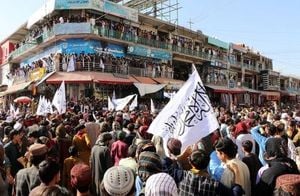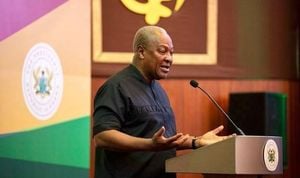On September 26, 2025, the U.S. government delivered a seismic announcement for thousands of Syrians living in America: Temporary Protected Status (TPS), a legal lifeline since 2012, would be terminated for Syrian nationals. The Department of Homeland Security (DHS) revealed that roughly 6,000 Syrians, many of whom have built lives and communities over more than a decade, now face a strict 60-day deadline to depart the country. The news has sent ripples through immigrant communities, legal circles, and international policy watchers, all while the debate over U.S. sanctions on Syria intensifies in Congress.
"After a careful review of conditions in Syria," Homeland Security Secretary Kristi Noem said in a statement, "the program is temporary in nature and circumstances no longer prevent Syrians from returning home." According to Tricia McLaughlin, assistant secretary of Homeland Security for Public Affairs, the decision was influenced by an assessment that Syria no longer constitutes a danger preventing its citizens from returning. McLaughlin added that the country "was a hub for terrorism and extremism for nearly two decades," and that continued protection for Syrians "conflicts with U.S. national interests."
The DHS order, effective immediately, gives Syrians until November 21, 2025, to leave the United States. Those covered by TPS are being offered a free airline ticket and a $1,000 cash stipend if they use the CBP Home app to report their voluntary departure. The government insists that this approach provides a humane transition, but also warns that anyone who fails to leave by the deadline faces arrest, deportation, and a permanent ban from returning to the U.S.
TPS, first established by Congress in 1990, was designed to offer temporary legal status to foreign nationals from countries facing armed conflict or natural disaster. While it allows for legal residence and work authorization, it does not provide a direct path to permanent residency. Syria’s TPS designation had been repeatedly extended over the last decade due to the ongoing civil war and humanitarian crisis, including during President Trump’s first term. The recent move, however, marks a sharp policy shift, especially as the White House signals a belief that Syria is no longer unsafe for returnees.
With Syrians now excluded, TPS currently remains in place for nationals of Lebanon, Yemen, Sudan, South Sudan, Somalia, Ethiopia, Myanmar, Venezuela, El Salvador, Haiti, and Ukraine. According to DHS figures, about 1,770 Syrians currently live in Michigan under TPS, while the total number of beneficiaries across all nationalities is roughly 4,000—a stark drop from previous years, reflecting tighter eligibility and shifting U.S. priorities.
As these policy changes unfold, a parallel debate is raging in Washington over the future of U.S. sanctions on Syria. On the same day as the TPS announcement, Rabbi Yusuf Hamra, head of the Jewish Heritage in Syria Foundation and a prominent leader of the Syrian Jewish community in Brooklyn, New York, issued a public appeal to the U.S. Congress. Hamra urged lawmakers to reject Amendment 3889, a legislative proposal introduced by Republican Senator Lindsey Graham as part of the National Defense Authorization Act for 2026. The amendment would make sanctions on Damascus permanent under the Caesar Syria Civilian Protection Act.
Hamra’s plea has caught the attention of both political insiders and the broader public. He warned that the amendment—containing provisions for automatic reimposition of sanctions, known as "snapback," and blocking their full repeal—would be "harsher than previous measures." According to Hamra, "continued sanctions would lead to economic paralysis, obstruct reconstruction, and threaten efforts to preserve Syrian Jewish heritage, including projects to rehabilitate synagogues and Jewish cemeteries." He further noted that the Syrian Jewish community, absent from Syria for more than three decades, would remain unable to return or revive its heritage in such a restrictive economic environment.
"The Caesar Act had already served its purpose in holding war criminals accountable, but keeping it permanently in place would turn it into an obstacle to building a shared future in Syria," Hamra said in his message to Congress. He called on senators to vote against Amendment 3889 and to support a full repeal of the Caesar Act, arguing that such a step would "allow all Syrian communities—including Jews—to return and take part in reconstruction while protecting religious and historical diversity for future generations."
The Caesar Syria Civilian Protection Act, passed in 2019 and implemented in June 2020, was named after a Syrian defector who smuggled thousands of photographs documenting abuses in Syrian prisons. The law targets the Syrian government and its security apparatus, imposing sweeping sanctions on critical sectors such as energy, construction, banking, and aviation. It also includes "secondary sanctions"—penalties for foreign companies or individuals conducting business with Damascus. Supporters of the law argue that these measures are a vital nonmilitary tool to pressure the Syrian government into ending rights violations and negotiating a political settlement under United Nations Security Council Resolution 2254.
Yet the impact of these sanctions has been severe. According to The Media Line, the measures have contributed to the collapse of the Syrian pound, soaring prices, and widespread hardship for ordinary Syrians. Critics, including Hamra, see the sanctions as a humanitarian and cultural burden that deepens civilian suffering and threatens ancient heritage. Meanwhile, supporters maintain that lifting sanctions without clear political and humanitarian guarantees would give Damascus a "blank check" and undermine accountability for wartime atrocities.
The debate is further complicated by recent political developments inside Syria. Since taking office after Bashar al-Assad’s flight from the country in December 2024, President Ahmed al-Sharaa has pledged to pursue a UN-backed political process, reopen diplomatic channels with Arab neighbors and Western governments, and prioritize reconstruction and refugee returns. According to Syrian officials, early steps have included releasing some detainees, easing restrictions on humanitarian operations, and initiating talks with opposition representatives. The new administration has also requested phased sanctions relief tied to measurable progress.
U.S. officials, however, remain cautious. They insist that any easing or full repeal of sanctions must be conditioned on concrete actions by Damascus: halting rights violations, providing guarantees for refugee returns, and engaging in a credible political process. As Congress continues to debate Amendment 3889, the controversy persists between those who see sanctions as essential to deterring the Syrian government and those who view them as an obstacle to humanitarian recovery and cultural renewal.
For Syrians in the U.S. now facing imminent departure, the policy shifts are deeply personal. Many have spent years in limbo, unable to return home but also unable to build permanent lives in America. The loss of TPS, coupled with ongoing economic and political uncertainty in Syria, leaves them at a crossroads—caught between two worlds, with neither offering easy answers.
In the end, the fate of Syrian nationals in the U.S. and the future of U.S. policy toward Syria remain intertwined. As lawmakers weigh the competing demands of justice, security, and humanitarian need, the lives of thousands hang in the balance—waiting for a resolution that, for now, remains just out of reach.



